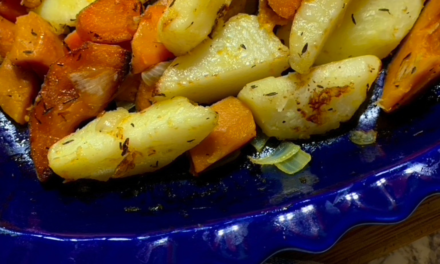Ingredients
- One medium butternut squash about 1 1/2 to 2 pounds
- One tablespoon olive oil
- 1/8 teaspoon unrefined sea salt
- Freshly ground black pepper
- 6-7 cups vegetable bouillon
- One cup diced onions
- 1/2 cup wild rice or wild rice blend
- One cups fresh corn (can use frozen)
- 3/4 cups unsweetened vegan milk (oat, almond, etc.)
- 1 tsp. each dried thyme and dried sage
- Fresh sage for garnish
- 2 tsp. chopped fresh parsley
Directions
- Scrub the squash; cut it vertically; and remove the seeds. No need to remove the skin; it softens when cooked.
- Rub 1/2 tablespoon of the olive oil into the squash and sprinkle with salt and pepper.
- Place on a baking sheet and bake at 400 degrees for 45-50 minutes or until tender. Remove from oven and allow it to cool. If you want it to cook more quickly, cut into chunks.
- Puree the squash with 1-2 cup of the bouillon in a food processor. Puree until smooth and set aside.
- In a deep soup pot, sauté the onions, dried sage, and thyme in olive oil with pinch of sea salt over medium heat. Add 4 cups of the bouillon and the rice. Cover, turn heat to a simmer, and cook until rice is tender, about 55 minutes. Stir occasionally.
- After the rice has cooked for about 35-40 minutes, add the corn and continue cooking.
- Add remaining bouillon and vegan milk along with the pureed squash to the rice and corn. Sprinkle with sea salt and pepper to taste. Stir, and gently simmer over low heat for about 10-15 minutes.
- Turn off heat and stir in fresh parsley. Garnish with fresh sage and/or chopped chives or scallions.
Options
- I like Imagine and Pacific Brands of Liquid bouillon.
- You can add vegan sausage. Sauté it with the onions and herbs.
- You can substitute kabocha squash for the butternut squash but don’t use the skin.
Therapeutic Properties
- Winter squashes are a warming food and are medicinal to the spleen, pancreas and stomach
- Improves energy circulation
- Squash is high in complex carbohydrates, the kind we all need to sustain energy. The body’s greatest need is for complex carbohydrates
- Helpful for digestive problems
- Provides vitamins A and C, potassium, iron, riboflavin and magnesium
- Excellent source of pre-vitamin A and carotenoids




